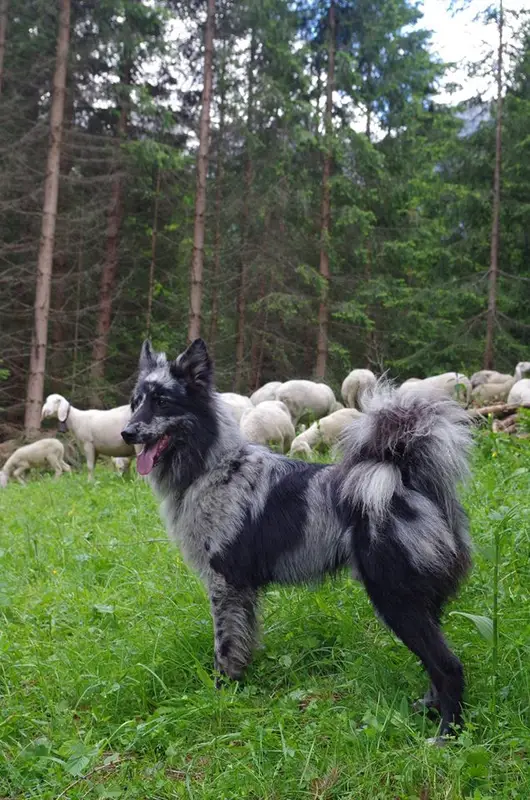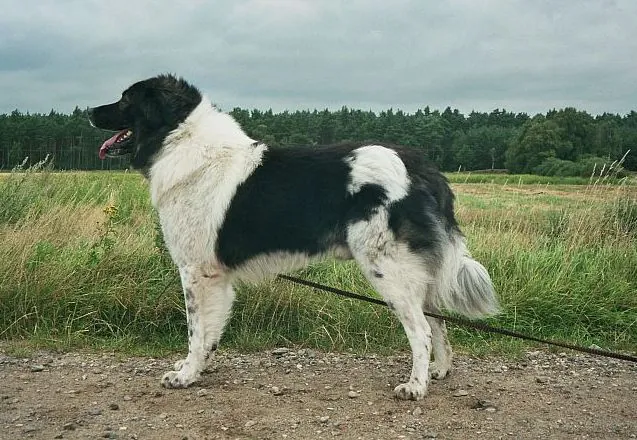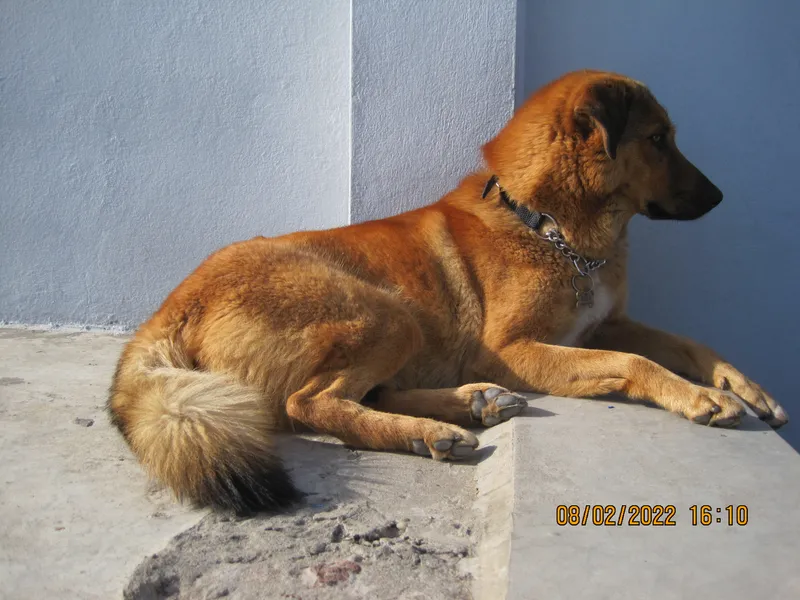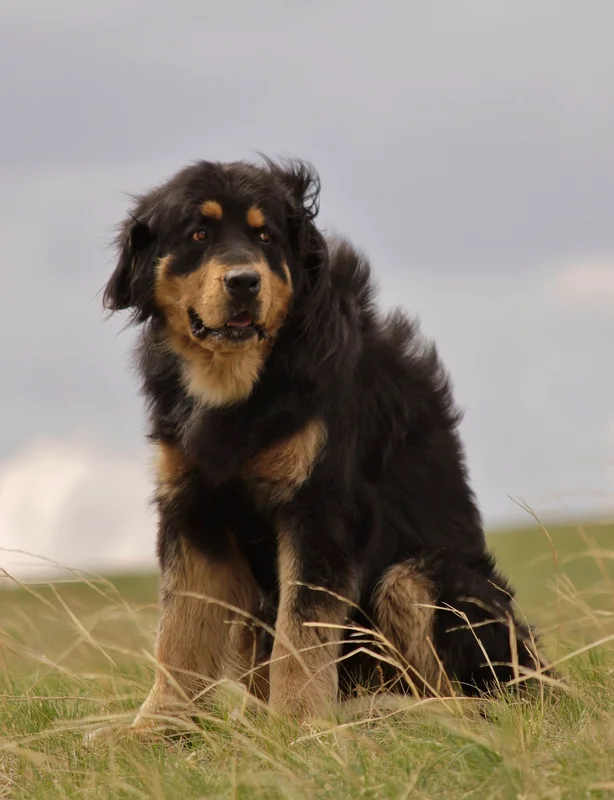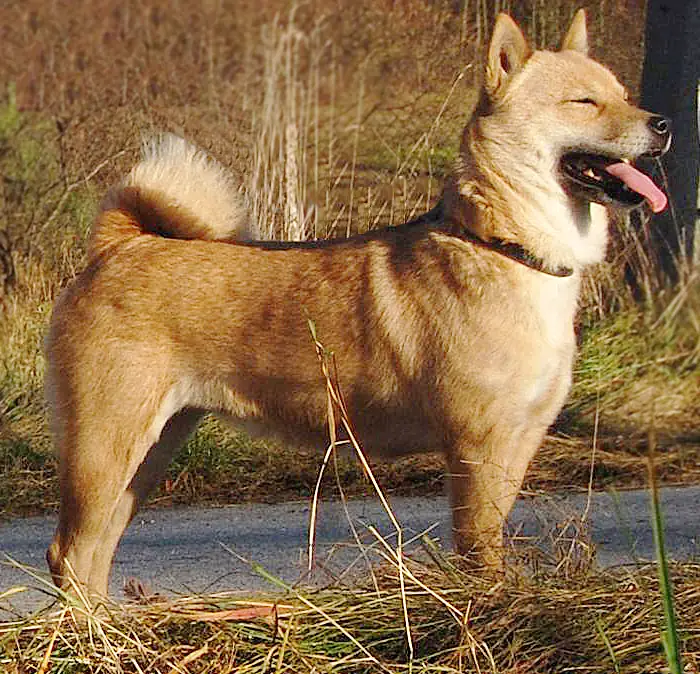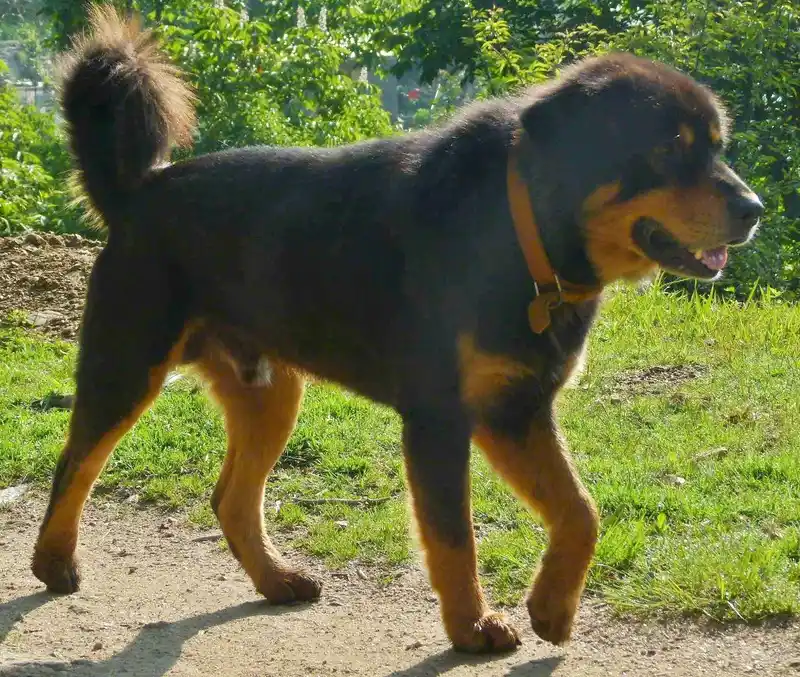Kuchi
Also known as: Afghan Shepherd, Coochi, De Kochyano Spai, Jangi Spai, Koochee
The Kuchi dog, or Afghan Shepherd, is a powerful and loyal breed known for its guarding abilities and adaptability to harsh environments. With a rich history tied to the nomadic Kuchi people, these dogs are excellent companions for those who appreciate their independent nature and strong work drive.
⚡At a glance
🏆Best traits
Key Facts
- Height
- 69-89 cm
- Weight
- 38-80 kg
- Life Span
- 10 - 14 years
- Group
- Working
- Origin
- Afghanistan
- Shedding
- Moderate
- Exercise
- 90 min/day
- Best For
- Families, Active Owners
Overview
🐕Breed Overview
✨Key Traits
💡What Makes Kuchi Special
The Kuchi dog's most defining traits include its unwavering loyalty, strong territorial instincts, and remarkable adaptability to various environments. They are known for their impressive strength and agility, making them formidable guardians of livestock and property.
Their independent nature allows them to function without constant supervision, which can be both a strength and a challenge for owners. Kuchi dogs are also highly intelligent, capable of learning complex tasks and commands, but they require an experienced owner who understands their unique needs and temperament.
Their vocalizations, including growling and barking, are part of their communication style, often reflecting their emotions and alertness to their surroundings. Overall, Kuchi dogs are best suited for owners who can provide them with the space, exercise, and mental stimulation they require to thrive.
The Kuchi dog, also known as the Afghan Shepherd, is a remarkable breed that embodies the spirit of resilience and adaptability. Originating from the nomadic Kuchi people of Afghanistan, these dogs have been essential companions for centuries, serving as guardians of livestock and protectors of caravans. With a rich genetic background, Kuchi dogs exhibit a diverse range of physical characteristics, from their size and coat length to their head shapes.
Typically large and powerful, they can weigh between 84 to 176 pounds and stand between 27 to 35 inches tall. Their coats vary from short to long, often featuring thick underwool to withstand harsh climates. Kuchi dogs are known for their unwavering loyalty and protective instincts, making them excellent guardians.
Their temperament is a blend of independence and affection; while they form strong bonds with their families, they can be wary of strangers. This breed thrives in environments that allow for ample exercise and exploration, as they require significant physical activity to maintain their health and happiness. Training a Kuchi dog can be challenging due to their independent nature, but with consistent and positive reinforcement methods, they can learn a variety of commands and tasks.
Their strong work drive makes them well-suited for activities that engage their natural instincts, such as herding and guarding. In summary, the Kuchi dog is a unique breed that reflects the nomadic lifestyle of the Kuchi people. Their strength, agility, and loyalty make them exceptional companions for those who understand their needs and can provide the right environment for them to thrive.
Whether as a working dog or a family pet, the Kuchi dog is sure to leave a lasting impression with its remarkable character and abilities.
🎉Fun Facts
Kuchi dogs are known for their impressive stamina and can travel long distances without tiring.
Kuchi dogs have been known to form strong bonds with their human families, often displaying affection and loyalty.
The breed's adaptability allows them to thrive in various climates, from cold mountains to hot deserts.
Their guarding instincts make them excellent watchdogs, alerting their owners to any potential threats.
They have a unique vocalization style, often growling to express emotions, which can be misinterpreted as aggression.
Breed Characteristics
Family & Friends
Good Behavior
Get Up & Go
Household Harmony
Temperament & Personality
🐕Core Temperament
The Kuchi dog's temperament is a blend of loyalty, independence, and protectiveness. They are known for their strong guarding instincts, making them excellent watchdogs.
While they can be friendly and affectionate with their families, they may exhibit wariness towards strangers and other animals. This breed requires early socialization to help them develop positive interactions with unfamiliar people and pets.
Kuchi dogs are intelligent and capable of learning commands, but their independent nature may lead to stubbornness, necessitating consistent training and reinforcement. Overall, Kuchi dogs thrive in environments where they can exercise their natural instincts and fulfill their roles as guardians.
💫Personality Profile
Kuchi dogs are characterized by their strong independence and protective nature. They are highly loyal to their families and can be affectionate, forming deep emotional bonds with their owners.
However, their independent streak means they may not always seek constant companionship, preferring to observe their surroundings. This breed is known for its vigilance and can be wary of strangers, making them excellent guardians.
Their intelligence allows them to learn commands and tasks quickly, but they may also exhibit stubbornness, requiring consistent training and socialization from an early age. Kuchi dogs thrive in environments where they can exercise their natural instincts and engage in physical activities, making them well-suited for active families or individuals.
🔊Vocal Tendencies
Kuchi dogs are known for their vocal nature, often expressing themselves through growling, barking, and howling. Their vocalizations can vary depending on the situation; for instance, they may bark to alert their owners of intruders or growl when playing or feeling content.
While their growling can sometimes be misinterpreted as aggression, it is often a form of communication that reflects their emotions. Kuchi dogs may also bark when excited or anxious, making them quite vocal in various situations.
Their noise level can be a consideration for potential owners, especially in urban settings where excessive barking may be problematic.
Affection & Social Traits
More independent with affection — here’s how it shows up day to day.
Energy & Activity
Moderate, steady energy — great for matching your routine.
Communication Style
Expressive and vocal — a quick read on noise at home.
Care Requirements
🏃♂️Exercise Requirements
Daily Exercise
The Kuchi dog is a highly active breed that requires significant exercise to maintain its physical and mental well-being. Ideally, an adult Kuchi should engage in at least 90 minutes of vigorous exercise daily.
This can include activities such as long walks, running, and engaging in herding or guarding exercises that tap into their natural instincts. Puppies should have shorter, more frequent play sessions to avoid overexertion, while senior Kuchi dogs may require moderate exercise to accommodate their energy levels.
Regular exercise not only helps manage their weight but also reduces the likelihood of behavioral issues stemming from pent-up energy. Insufficient exercise can lead to destructive behaviors, anxiety, and aggression, particularly given their protective nature.
Preferred Activities
🏠Living & Adaptability
Space Requirements
Kuchi dogs thrive in environments that provide ample space for movement and exploration. Ideally, they should have access to a large, securely fenced yard where they can roam freely.
While they can adapt to living in rural settings, they are not well-suited for apartment living due to their size and exercise needs. Owners in urban areas should ensure they can provide sufficient daily exercise and mental stimulation through regular outings to parks or open areas.
The breed's size and energy levels necessitate a living environment that allows for physical activity and exploration, as confinement can lead to frustration and behavioral issues.
Climate Preference
🍲Feeding Guide
Schedule
Food Types
Portion Size
Special Nutritional Needs
Kuchi dogs may require a diet rich in protein to support their active lifestyle. It's essential to choose high-quality dog food that meets their nutritional needs, particularly during their growth stages as puppies.
Some Kuchi dogs may also have sensitivities to certain ingredients, so monitoring their diet for any adverse reactions is crucial. Regular veterinary check-ups can help determine any specific dietary requirements based on individual health conditions.
✨Grooming Requirements
Grooming Overview
The grooming needs of Kuchi dogs can vary significantly based on their coat type. Generally, they require regular brushing to manage shedding and maintain coat health.
For dogs with longer coats, brushing should be done at least twice a week to prevent matting and tangles. Bathing should be done as needed, typically every few months, or more frequently if they get particularly dirty.
Regular nail trimming and ear cleaning are also essential to maintain overall hygiene. Given their thick undercoat, Kuchi dogs may shed heavily during seasonal changes, requiring more frequent grooming during these times to manage loose hair effectively.
Care Schedule
Brush 2-3 times a week for long-haired dogs; monthly baths; trim nails every 2-4 weeks.
Health Profile
⚕️Health Care
Regular health care is vital for the Kuchi dog's longevity. Routine veterinary check-ups, vaccinations, and preventive treatments are essential to catch any health issues early.
Maintaining a balanced diet, providing regular exercise, and monitoring for any signs of illness can significantly impact the dog's overall health and lifespan. Owners should also be proactive in managing any breed-specific health concerns through regular health screenings and appropriate veterinary care.
Health Issues Overview
⏳Average Lifespan
Genetic Factors
Genetics play a crucial role in the Kuchi dog's lifespan, with certain hereditary health issues being more prevalent in the breed. Responsible breeding practices can help mitigate these risks, ensuring a healthier gene pool.
Potential owners should seek out breeders who prioritize genetic health testing and maintain a diverse breeding program to reduce the likelihood of inherited conditions. Understanding the genetic background of a Kuchi dog can provide insights into its potential health issues and lifespan.
Living Conditions
The Kuchi dog's lifespan can be significantly influenced by its living environment. Dogs that are kept in spacious, secure areas with access to regular exercise tend to live longer, healthier lives.
Exposure to harsh weather conditions, such as extreme heat or cold, can negatively impact their health and longevity. Additionally, social interactions with humans and other animals can affect their mental well-being, which is crucial for overall health.
Providing a stable and nurturing environment, along with regular veterinary care, can enhance the Kuchi dog's lifespan.
🏥Common Health Issues
Hip Dysplasia
Warning Signs
🔬Diagnosis
X-rays and physical examination by a veterinarian.
💊Treatment
Pain management, weight control, and in severe cases, surgical intervention.
📝Management Tips
Maintain a healthy weight, provide joint supplements, and engage in low-impact exercise.
Obesity
Warning Signs
🔬Diagnosis
Physical examination and body condition scoring by a veterinarian.
💊Treatment
Dietary changes and increased physical activity.
📝Management Tips
Monitor diet, provide regular exercise, and avoid overfeeding.
Dental Disease
Warning Signs
🔬Diagnosis
Veterinary dental examination.
💊Treatment
Professional dental cleaning and possible tooth extraction.
📝Management Tips
Regular dental cleanings and at-home dental care.
🛡️Preventive Care
🔬Hip Evaluation
Evaluates the dog's hips for dysplasia and other abnormalities, crucial for preventing mobility issues.
📅 Every 1-2 years, especially for breeding dogs.
🔬Comprehensive Health Screening
Assesses the dog's overall health and identifies any potential genetic issues that may affect longevity.
📅 Annually for adult dogs; more frequently for older dogs.
🔬Parasite Testing
Checks for common parasites and overall health, ensuring the dog is free from infections that could impact health.
📅 Every 6-12 months, depending on lifestyle and exposure.
Training
🧠Intelligence & Trainability
💪Work Drive
Kuchi dogs possess a strong work drive, stemming from their historical roles as guardians and protectors. They thrive when given tasks that challenge their physical and mental abilities.
Activities such as herding, guarding, and participating in dog sports can help fulfill their need for purpose and engagement. Without sufficient mental stimulation, Kuchi dogs may become bored and exhibit undesirable behaviors.
Providing them with jobs or activities that align with their instincts is essential for their overall well-being and happiness.
⚠️Training Considerations
Kuchi dogs can present several behavioral challenges, primarily due to their independent nature and strong territorial instincts. They may exhibit aggression towards unfamiliar dogs and people, particularly if they perceive them as threats to their territory.
This can be mitigated through early socialization and consistent training, emphasizing positive reinforcement techniques. Additionally, their high energy levels require owners to provide ample physical and mental stimulation to prevent boredom-related behaviors, such as digging or excessive barking.
Understanding the breed's natural instincts and providing appropriate outlets for their energy is crucial for successful training and behavior management.
📝Training Tips
Training a Kuchi dog requires patience, consistency, and a firm yet gentle approach. Given their independent nature, establishing a strong bond with the dog is essential for effective training.
Start with basic obedience commands and gradually introduce more complex tasks, using positive reinforcement methods such as treats and praise. Socialization is critical; expose the dog to various environments, people, and other animals from a young age to reduce territorial aggression.
Engaging in activities that stimulate their natural instincts, such as herding exercises or agility training, can also enhance their training experience and strengthen the bond between owner and dog.
History & Heritage
📜Origin Story
The Kuchi dog, also known as the Afghan Shepherd, traces its roots to the nomadic Kuchi people of Afghanistan, who have relied on these dogs for centuries to protect their livestock and caravans. The breed's name, derived from the Kuchi people, reflects its deep connection to nomadic life.
Historically, these dogs have traversed the rugged landscapes of Afghanistan, from the towering Pamir mountains to the vast deserts, showcasing their adaptability to extreme conditions. As the Kuchi people migrated in search of grazing lands, their dogs accompanied them, proving invaluable in guarding against predators such as wolves and big cats.
The Kuchi dog's lineage is intertwined with the Central Asian Shepherd, sharing a common ancestry that has shaped its physical and behavioral traits. Despite the challenges posed by warfare and social upheaval in the region, the Kuchi dog has persisted, embodying the spirit of resilience and strength that defines the nomadic lifestyle.
⏳Development History
The Kuchi dog has evolved over centuries alongside the Kuchi people of Afghanistan, adapting to the diverse environments of the region, from mountainous terrains to arid deserts. This breed's development is characterized by natural selection, where only the most resilient and capable dogs survived in harsh conditions.
The Kuchi's genetic diversity is a result of interbreeding with other local breeds, particularly during periods of conflict and migration. While some Kuchi dogs have been exported to Europe, the breed remains largely unstandardized, with variations in appearance and temperament reflecting their nomadic heritage.
The lack of formal breeding practices has contributed to the breed's rich gene pool, allowing for a wide range of physical characteristics and temperaments.
🛡️Purpose & Historical Role
Traditionally, the Kuchi dog has served multiple roles, primarily as a livestock guardian and protector of nomadic camps. Their fierce loyalty and protective instincts have made them essential companions for the Kuchi people, safeguarding flocks of sheep, goats, and camels from various threats.
In addition to their guarding duties, Kuchi dogs have also been used in hunting and as companions during long treks across challenging terrains. Their ability to adapt to different environments and their strong work ethic have solidified their status as reliable working dogs, capable of thriving in the most demanding conditions.
🏺Cultural Significance
The Kuchi dog holds a significant place in Afghan culture, particularly among the nomadic Kuchi people. Historically, these dogs have been essential for protecting livestock and caravans from predators and thieves, showcasing their importance in the survival of nomadic lifestyles.
Their role extends beyond mere companionship; they are integral to the Kuchi way of life, embodying the resilience and adaptability required to thrive in harsh environments. The breed's association with nomadic culture has also influenced its characteristics, making them highly independent and capable of functioning without constant human guidance.
In contemporary times, the Kuchi dog has gained recognition in various regions, including Europe, where they are appreciated for their guarding abilities and unique heritage.
Conservation Status
The breed exists today and isn’t classified as extinct.
Less widespread; more likely to be region-specific or niche.
This breed is less common but has stable populations in certain regions.
?Frequently Asked Questions
Is the Kuchi good for apartment living?
No, the Kuchi is not typically recommended for apartment living. They require significant space to move and exercise, and confined living can lead to frustration and behavioral issues. A home with a large yard is strongly recommended.
How much does a Kuchi shed?
The Kuchi has a moderate shedding level. You can expect some hair around the house, especially during seasonal changes. Regular brushing a few times per week will help keep shedding under control.
Are Kuchis easy to train?
The Kuchi can be moderate when it comes to training. They can learn commands and routines with consistent effort, though they may sometimes show a stubborn streak. Patience, positive reinforcement, and regular practice sessions will yield the best results.
How long do Kuchis live?
The average lifespan of a Kuchi is 10 - 14 years. Lifespan can be influenced by genetics, diet, exercise, and overall health care. Regular veterinary check-ups and a healthy lifestyle can help your Kuchi live a long and happy life.
Is the Kuchi good with kids?
The Kuchi can be moderate around children. They generally tolerate kids well but may need time to adjust. Teaching children how to interact gently and respectfully with the dog is important for building a positive relationship.
How much exercise does a Kuchi need?
The Kuchi is a high-energy breed that needs approximately 90 minutes of exercise daily. They thrive with vigorous activities such as running, hiking, or interactive games. Without adequate exercise, they may develop behavioral issues from pent-up energy.
Is the Kuchi good with other pets?
The Kuchi may struggle with other pets, particularly smaller animals. Their prey drive or territorial nature can make multi-pet households challenging. Careful introductions, training, and supervision are essential.
